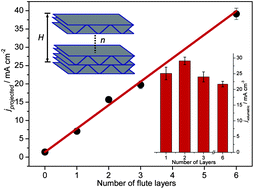Scientists in China and Germany have carbonised corrugated cardboard and from it made layered corrugated carbon as a cheap, high performance electrode material for microbial fuel cells. The microbial bioelectrochemical system of the fuel cell works by using an anode to biocatalytically oxidise complex organic matter and convert this chemical energy into a current flow. With the cardboard, the cell reaches a current density of 40 mA cm-2, one order of magnitude higher than current microbial bioelectrochemical systems, which achieve a current density of <4 mA cm-2.
Read this hot EES communication in full today:
Layered corrugated electrode macrostructures boost microbial bioelectrocatalysis
Shuiliang Chen, Guanghua He, Qin Liu, Falk Harnisch, Yan Zhou, Yu Chen, Muddasir Hanif, Suqin Wang, Xinwen Peng, Haoqing Hou and Uwe Schröder
DOI: 10.1039/C2EE23344D











